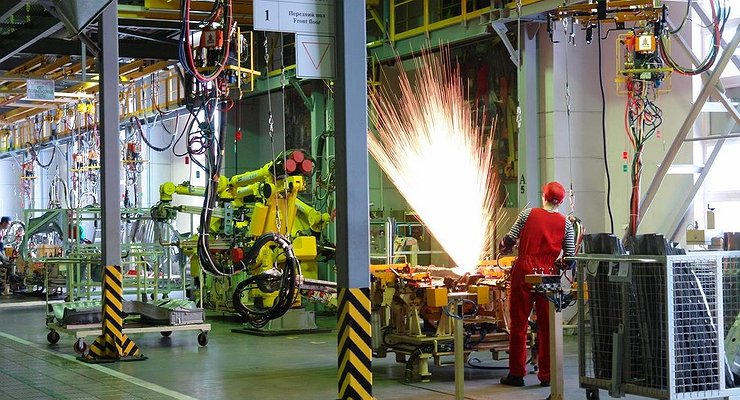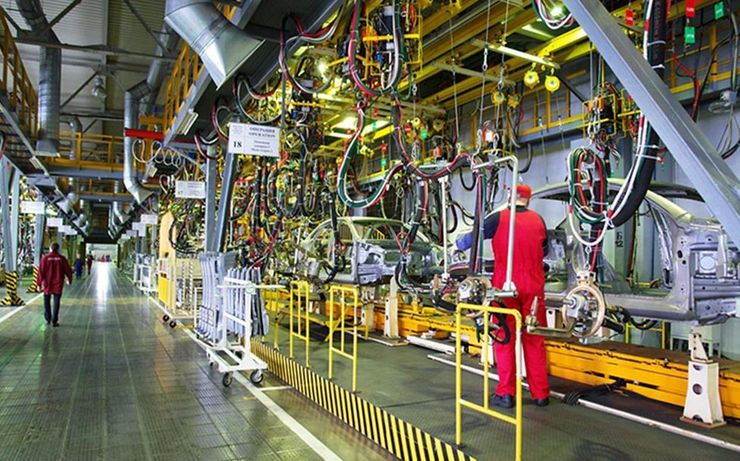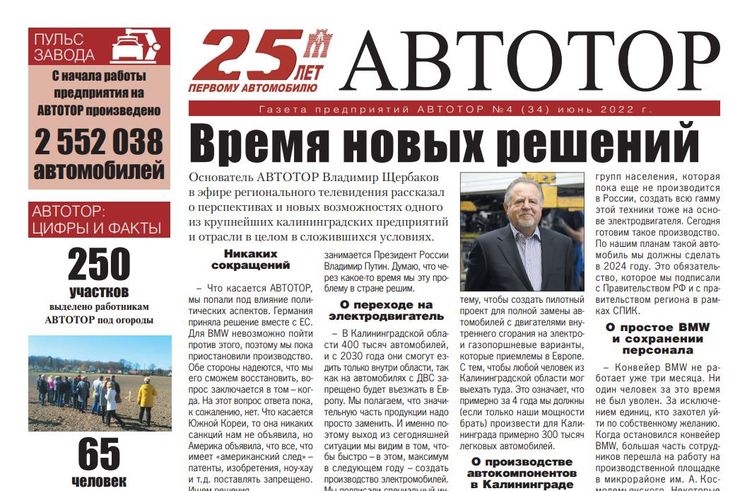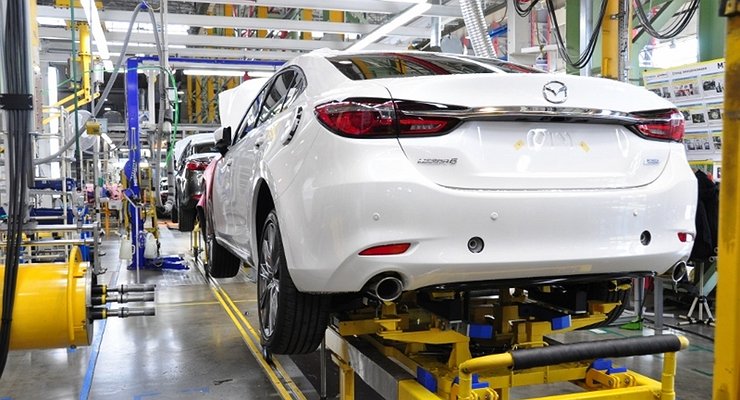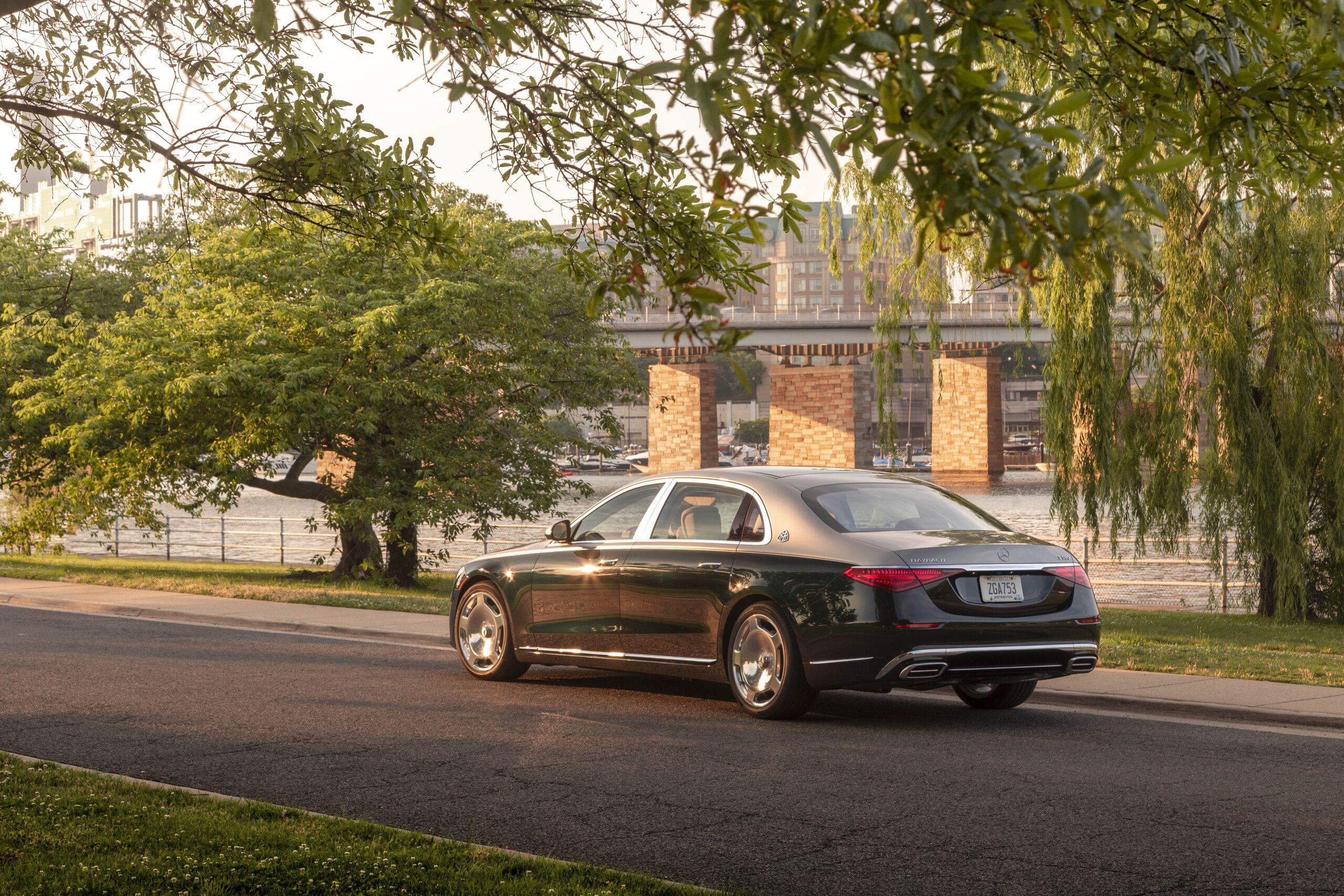After the collapse of all the usual business models, the Russian car factories essentially had the only hope – for their native state, which never got them into trouble. However, they are in no rush to provide the authorities with support for real, technologically groundbreaking production. It’s much easier to get funding for trendy projects, which will most likely be supported by the ‘economic bloc’, which doesn’t think of any efficiency there in such cases.
One of the pillars of our automotive industry is undoubtedly the Kaliningrad Avtotor. Of course, this is not AVTOVAZ, but quite a serious undertaking capable of producing up to 250,000 cars per year. Before the imposition of sanctions against Russia, in addition to budget Hyundai and Kia, premium BMW and Genesis rolled off the assembly line.
Under pressure from their government, the Bavarians have suspended the supply of cars to our country, as well as their local production, since March 1. “Suspended” in this context should be seen as a euphemism for “discontinued” as they are unlikely to return with serious production plans in the near future. Hyundai and Kia also shyly crept away from our customers, explaining their steps embarrassingly due to their lack of experience in critical conditions.
Well, unlike the Germans and Koreans, we have a similar experience. Vladimir Shcherbakov, the founder of the Kaliningrad car company, was not slow to announce this. Judging by the determined attitude of the owner, Avtotor, he will not give up: “October will be spent reconfiguring production, setting it up. After that, we will start implementing a new policy and producing new models adapted to the new conditions for the development of Russia as a whole and our production in the country.” Well how? Very uplifting.
Even more encouraging are the words that come from the same lips, said in an interview with Forbes: “We believe that the workforce is the most important thing to retain. We now have 3,500 employees and there are still people on contract working there. We are also responsible for the people who work for us at other companies.” Wonderful, to say the least, but only so far.
Furthermore, Vladimir Shcherbakov generously relieves us of the need to guess who will be the new partner of his company – Chinese, Iranian or other automakers unknown to us. “We are going to start producing electric vehicles,” he explains with a black eye. It appears that the company will produce compact electric vehicles for the young, the elderly and the inactive. Of course, this is the same category of wealthy idlers who are the target of expensive and inefficient electric transport.
We plan to make 50-60 thousand electric vehicles. Full transition from 2024 to electric vehicles. We should produce about 300 thousand cars in four years. – Interfax quotes Shcherbakov. But this is not so good, how great.
As British mathematician and cryptographer Irving John Good noted, to paraphrase a German writer, “When I hear the word gun, I reach for my culture.” When I hear the word “electric car,” I reach for common sense. And my common sense tells me that something is wrong in the Danish kingdom, oh, it’s wrong.
I am not a categorical opponent of this type of transport, although I personally have no sympathy for it. But, say, in an economically prosperous country with a balanced budget – why not play these games? Everything must have a measure, a place and a time. In the midst of a crisis, with colossal external political pressure and in the absence of advanced domestic technologies, it is beyond my understanding to do such a monkey trade.
Car production brings a good income for the budget, and this is an indisputable fact. However, this only happens when the budget receives and does not invest. With electric cars, this option does not apply in any country in the world. Everywhere, all sectors of the economy are heavily subsidized, which are somehow affected by the life cycle of this product – unaffordable, uncompetitive and unviable without massive political propaganda and serious financial injections.
An addendum to the SPIC signed in September 2021 and which remained in force after the start of the crisis, obliges Avtotor to invest 20 billion rubles in the production of electric vehicles and auto parts. The intention is to allocate 5.7 billion for just 7 factories that the company wants to build from the ground up. Am I the only one who thinks that these investments will not return, let alone make a profit? How many 50-60 thousand electric vehicles, if Shcherbakov himself says that the expected annual demand does not exceed 5-10 thousand units? How to join the incompatible?
It’s actually very simple. Avtotor relies on state aid as its backbone, and the owner speaks openly about it. And if you look at the merits, then in an interview with Rossiyskaya Gazeta, Shcherbakov states the following: “The level of knowledge, technology, competence and financial power of the Russian industry as a whole, in my opinion, does not yet allow for the new car. world-class tomorrow, and below that it’s easy to make it, it makes no sense”.
That is, the old song begins: “We are not local ourselves, help who can.” Only the technologies available today will be of a lower level and thinner quality. And we don’t own it, which is an example: for a fairly long period of sincere love with the West, we got almost nothing in terms of technology.
In general, it is necessary to saddle up the fashion trend and somehow reverse state support for several years. And there, you see, everything starts to go back to normal.
One of the pillars of our automotive industry is undoubtedly the Kaliningrad Avtotor. Of course, this is not AVTOVAZ, but quite a serious undertaking capable of producing up to 250,000 cars per year. Before the imposition of sanctions against Russia, in addition to budget Hyundai and Kia, premium BMW and Genesis rolled off the assembly line.
Under pressure from their government, the Bavarians have suspended the supply of cars to our country, as well as their local production, since March 1. “Suspended” in this context should be seen as a euphemism for “discontinued” as they are unlikely to return with serious production plans in the near future. Hyundai and Kia also shyly crept away from our customers, explaining their steps embarrassingly due to their lack of experience in critical conditions.
Well, unlike the Germans and Koreans, we have a similar experience. Vladimir Shcherbakov, the founder of the Kaliningrad car company, was not slow to announce this. Judging by the determined attitude of the owner, Avtotor, he will not give up: “October will be spent reconfiguring production, setting it up. After that, we will start implementing a new policy and producing new models adapted to the new conditions for the development of Russia as a whole and our production in the country.” Well how? Very uplifting.
Even more encouraging are the words that come from the same lips, said in an interview with Forbes: “We believe that the workforce is the most important thing to retain. We now have 3,500 employees and there are still people on contract working there. We are also responsible for the people who work for us at other companies.” Wonderful, to say the least, but only so far.
Furthermore, Vladimir Shcherbakov generously relieves us of the need to guess who will be the new partner of his company – Chinese, Iranian or other automakers unknown to us. “We are going to start producing electric vehicles,” he explains with a black eye. It appears that the company will produce compact electric vehicles for the young, the elderly and the inactive. Of course, this is the same category of wealthy idlers who are the target of expensive and inefficient electric transport.
We plan to make 50-60 thousand electric vehicles. Full transition from 2024 to electric vehicles. We should produce about 300 thousand cars in four years. – Interfax quotes Shcherbakov. But this is not so good, how great.
As British mathematician and cryptographer Irving John Good noted, to paraphrase a German writer, “When I hear the word gun, I reach for my culture.” When I hear the word “electric car,” I reach for common sense. And my common sense tells me that something is wrong in the Danish kingdom, oh, it’s wrong.
I am not a categorical opponent of this type of transport, although I personally have no sympathy for it. But, say, in an economically prosperous country with a balanced budget – why not play these games? Everything must have a measure, a place and a time. In the midst of a crisis, with colossal external political pressure and in the absence of advanced domestic technologies, it is beyond my understanding to do such a monkey trade.
Car production brings a good income for the budget, and this is an indisputable fact. However, this only happens when the budget receives and does not invest. With electric cars, this option does not apply in any country in the world. Everywhere, all sectors of the economy are heavily subsidized, which are somehow affected by the life cycle of this product – unaffordable, uncompetitive and unviable without massive political propaganda and serious financial injections.
An addendum to the SPIC signed in September 2021 and which remained in force after the start of the crisis, obliges Avtotor to invest 20 billion rubles in the production of electric vehicles and auto parts. The intention is to allocate 5.7 billion for just 7 factories that the company wants to build from the ground up. Am I the only one who thinks that these investments will not return, let alone make a profit? How many 50-60 thousand electric vehicles, if Shcherbakov himself says that the expected annual demand does not exceed 5-10 thousand units? How to join the incompatible?
It’s actually very simple. Avtotor relies on state aid as its backbone, and the owner speaks openly about it. And if you look at the merits, then in an interview with Rossiyskaya Gazeta, Shcherbakov states the following: “The level of knowledge, technology, competence and financial power of the Russian industry as a whole, in my opinion, does not yet allow for the new car. world-class tomorrow, and below that it’s easy to make it, it makes no sense”.
That is, the old song begins: “We are not local ourselves, help who can.” Only the technologies available today will be of a lower level and thinner quality. And we don’t own it, which is an example: for a fairly long period of sincere love with the West, we got almost nothing in terms of technology.
In general, it is necessary to saddle up the fashion trend and somehow reverse state support for several years. And there, you see, everything starts to go back to normal.
Source: Avto Vzglyad
I’m Sandra Torres, a passionate journalist and content creator. My specialty lies in covering the latest gadgets, trends and tech news for Div Bracket. With over 5 years of experience as a professional writer, I have built up an impressive portfolio of published works that showcase my expertise in this field.







